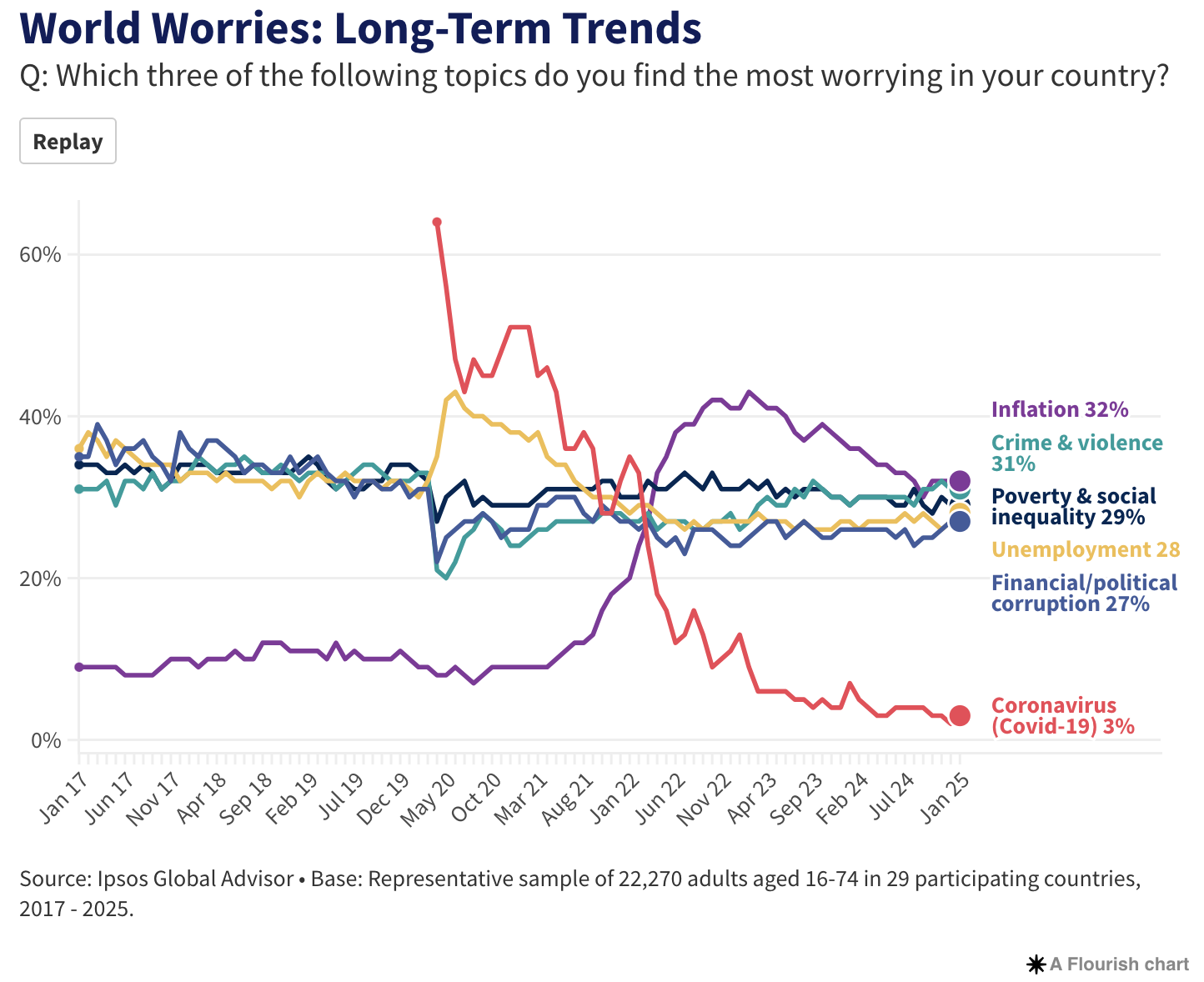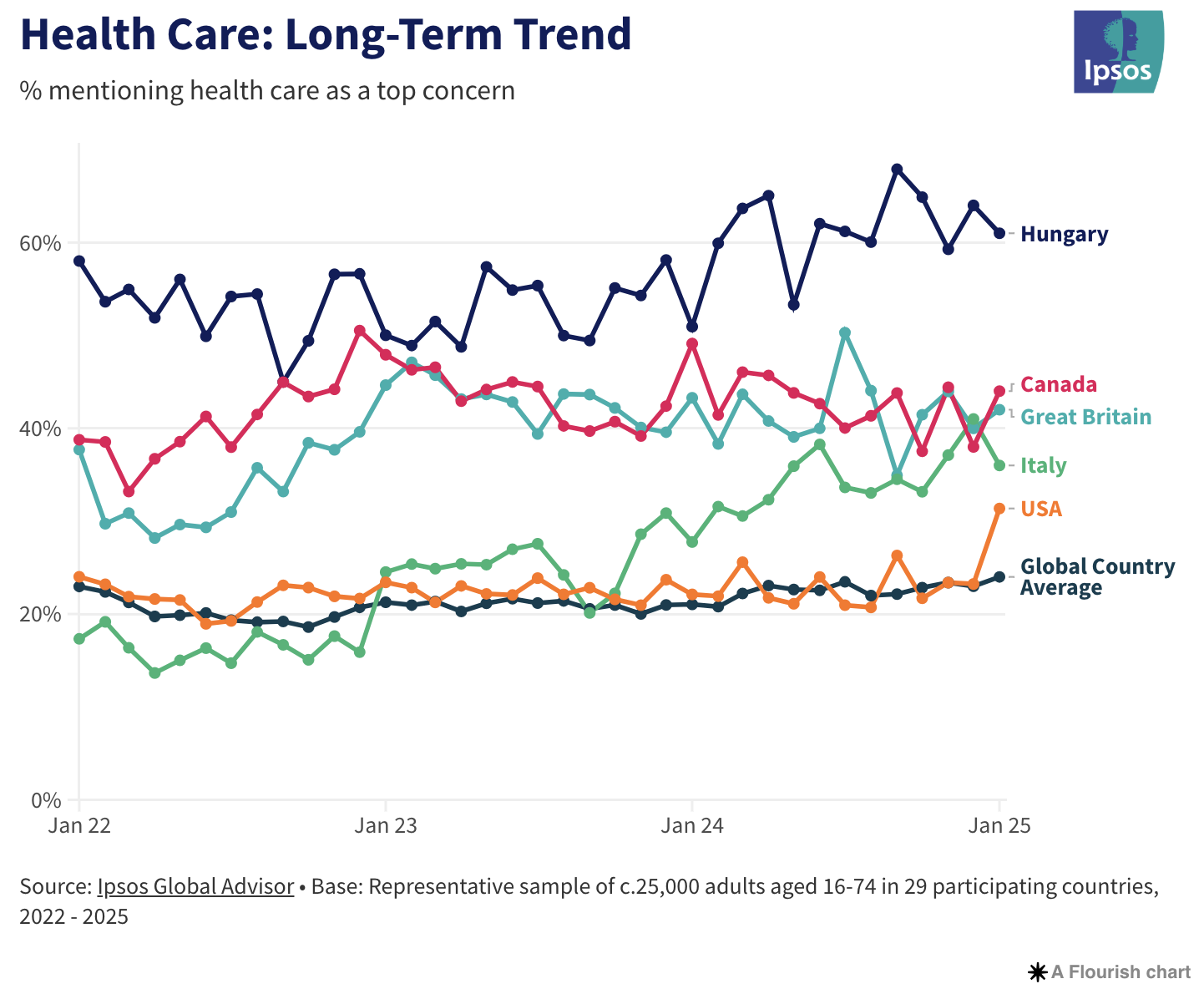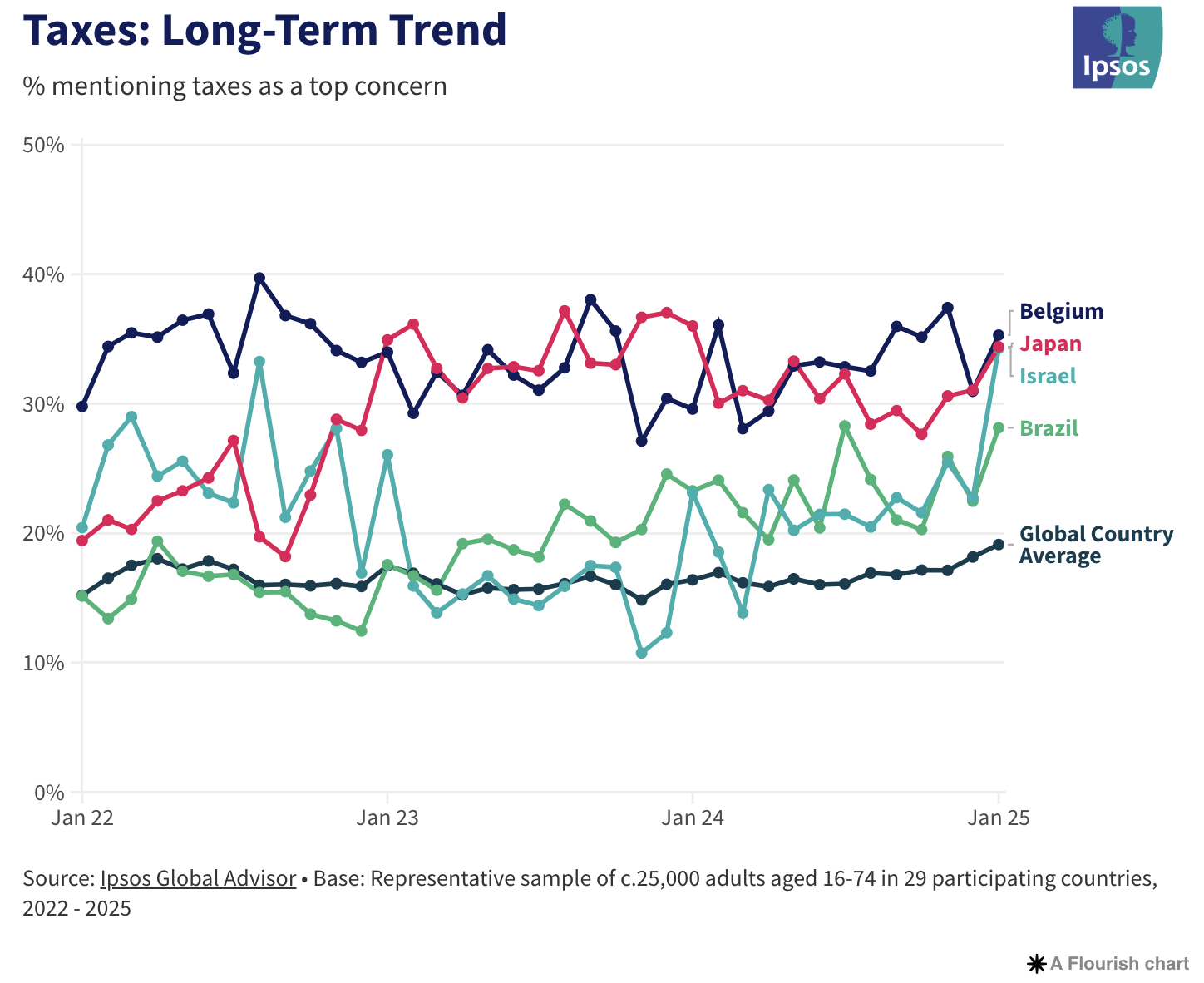What Worries the World – januari 2025
Our monthly What Worries the World survey explores what the public thinks are the most important social and political issues, drawing on more than ten years of data to place the latest scores in context.
Inflation remains the number one global concern, although only by a small margin.
Key findings:
- Inflation remains the leading concern, with 32% of respondents expressing worry—a figure unchanged since December but four percentage points lower than the same point last year. Notably, inflation is now only one point ahead of crime and violence as a primary concern.
- In South Korea, recent political turmoil has impacted public sentiment. The proportion of citizens who believe their country is "heading in the right direction" has fallen by three points since December, to an eight-year low of 14%. Meanwhile, concerns about corruption have surged, with 50% of respondents now identifying it as a major issue.
- The proportion of Americans saying inflation is one of the main issues in their country has fallen seven points over the month to 39%. This is the lowest it has been since January 2022. That said, it remains the number one concern in the US.
- In Sweden, concerns about crime & violence have been top of the country’s list for nearly eight and half years and 65% express worry this month.
- The proportion mentioning health care in Canada is up six points since December to 44% (joint first with inflation) and has increased eight points in the US to 31%. This is the highest score for the US since May 2020, when it was 32%.
- Concern about taxes in Israel is now the second biggest issue after the proportion citing it increased 11 points to 34%. It now sits behind terrorism (48%) and ahead of military conflict between nations (31%).

Inflation
Across 29 countries the proportion expressing concern over the cost of living has remained at 32%. This is the same as last month but is four points lower than January 2024.
The number saying they are worried about inflation in Türkiye has increased seven points this month, to nearly three-fifths (58%). Despite this being a high level, it is not unusual for the nation, with Türkiye having rising costs as their number one issue since November 2021.
On the contrary, there has been a seven point decline in mentions in the US, with two-fifths (39%) now concerned. This is the joint lowest score since January 2022 (when it was 27%). February 2024 also recorded 39%.
Crime & violence
Crime & violence across 29 countries remains at three in 10 (31%) mentioning it. Compared to this time last year, concern is up slightly.
The proportion of Swedes expressing concern about crime has jumped eight points this month to two in three (65%). It’s still the nation’s primary worry and has been for nearly eight and half years (101 months). Additionally, compared to January 2024, the level of worry is 12 points higher. However, it should be noted that this level isn’t unusual for Sweden, with September 2024 recording the same score.
Colombia has experienced the opposite, with concern dropping eight points to 36%, which is a similar level to what we usually see for the nation.
Financial/political corruption
Corruption as an issue across 29 nations remains at 27% citing it.
After the recent political turmoil last month in South Korea, the nation has experienced a significant rise in those expressing concern. This January, worry increased seven points and half (50%) now putt it as one of the major issues. This is 16 points higher than last January and the highest level for five years, when we recorded 52% in December 2019.
Likewise, with continued disapproval of their government, the proportion of Peruvians mentioning corruption has risen seven points to over half (54%). This is the highest it has been since May 2023, when it was also 54%.
Health care
Health care as an issue across 29 countries has been creeping up the list. This month, it’s increased slightly and compared to last January, it’s up three points, with 24% singling it out as a worry.
Concern has risen across North America this month. In Canada, the proportion of respondents identifying it as a key issue has increased by six points to 44%, placing it in a tie with inflation as the country’s top concern. However, this level of concern remains relatively consistent over time, being five points lower than during the same period last year.
Comparatively, in the US, the proportion mentioning health have jumped up eight points to 31%. Not only is this nine points higher than a year ago, but it’s also the highest level since May 2020, when it was 32%.

Taxes
The proportion mentioning taxes across 29 countries is up slightly from last time and, with 19% expressing worry, is three points higher than January 2024.
Israel has experienced the largest rise in concern this month after increasing 11 points to a third (34%) citing it as an issue. This is also 11 points higher than this time last year and the highest it has been for the nation since they were added to the survey in February 2015.
Additionally, it means that taxes are now the second biggest worry for Israelis, behind terrorism (48%) but ahead of military conflict between nations (31%).
The proportion of Japanese mentioning taxes is also at 34%, after rising three points. It’s now their joint first issue, alongside inequality.

Current economic situation
On average across 29 countries, 37% of people describe the economic situation in their country as “good”.
The biggest improvement, compared with this time last year, is Argentina, + 31pp to 38%. This is the largest 12-month increase the country has ever seen, and also the highest its good economy score has been since November 2017 (38%).
Of the 29 countries in our survey, positive economic sentiment has fallen most since last year in France, -down points to 10%. This is the largest fall over a 12 month period we’ve ever seen in France.
Meanwhile, Germany records a new all-time low score for the fourth consecutive month, now down 26%.

